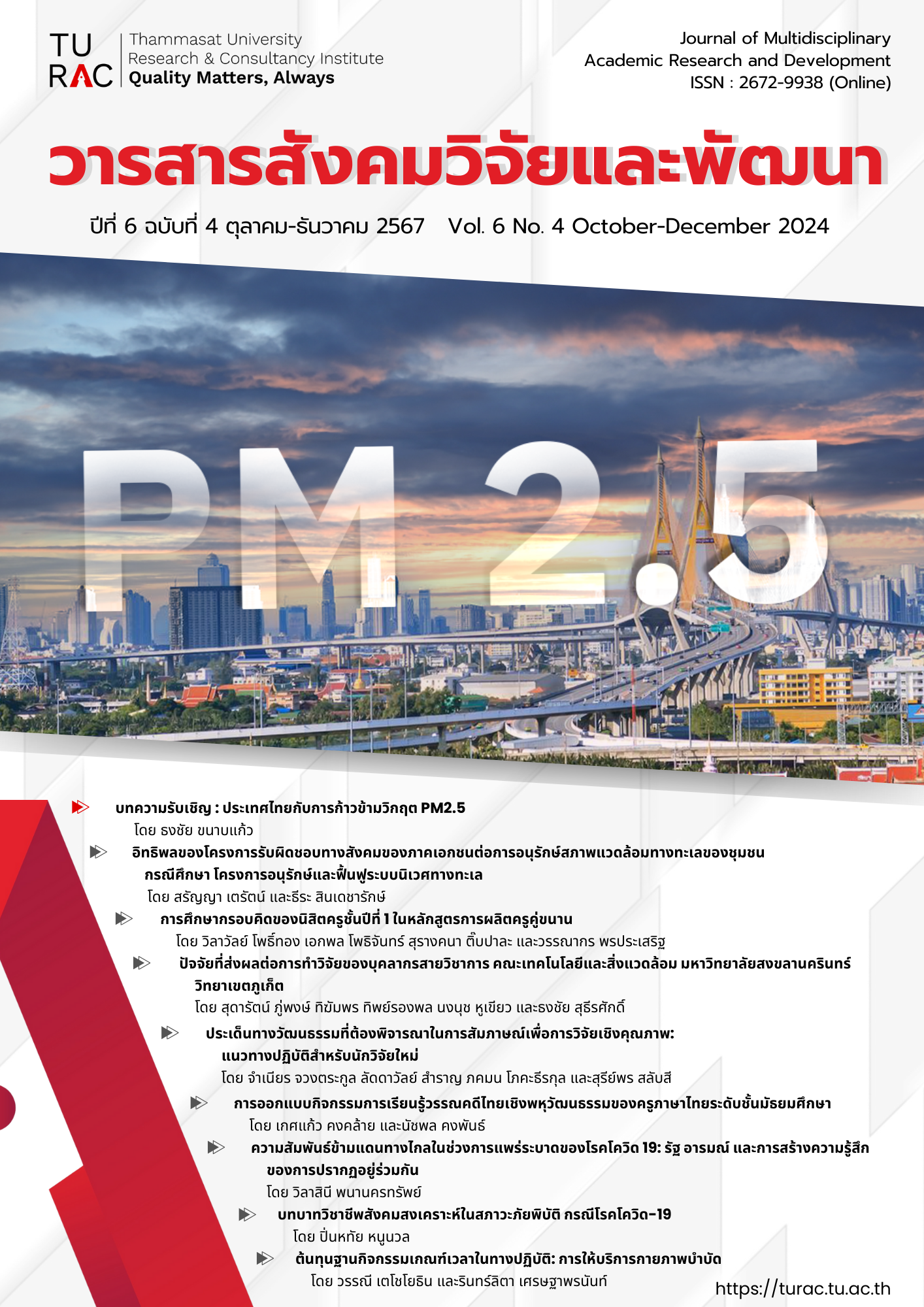The Impact of Corporate Social Responsibility (CSR) Initiatives on Community-Based Marine Environment Conservation: A Case Study of Marine Ecosystem Conservation and Restoration Projects
Keywords:
Marine Resource Conservation, Marine Resource Restoration, Corporate Social Responsibility, Learning and BehaviorAbstract
The effect of corporate social responsibility on the marine resource conservation behavior of communities is the aim of this study. A mixed methods approach was employed. Questionnaires were used to survey the crab-hatching behavior of community members who participated in marine resource conservation and restoration projects. This was combined with interviews to gather data on the project's impact on participants' behavioral changes. The participants, both for the questionnaires and interviews, were community members involved in the Conservation and Restoration of Marine Ecosystems Project in the provinces of Surat Thani, Prachuap Khiri Khan, Chumphon, Rayong, Phetchaburi, Samut Songkhram, Chonburi, and Chanthaburi, totaling 401 people. Social learning theory was used as the conceptual framework. We found that the project led to the development of consciousness and behaviors related to marine resource conservation. Social environment, learning centers, and knowledge of coastal ecology conservation and restoration were key elements in fostering awareness and promoting behavior change. Motivation also played an important role. When members recognized the tangible benefits of marine resource conservation, they were more willing to participate in conservation and restoration activities.
References
กรมทรัพยากรทางทะเลและชายฝั่ง. (2563). 10 อันดับขยะทะเล ที่เก็บได้ในประเทศไทย. สืบค้นจาก https://www.dmcr.go.th/detailAll/39525/nws/199.
คลังความรู้ทรัพยากรทางทะเลและชายฝั่ง. (2564). มลพิษทางทะเลและแนวทางแก้ไขในประเทศไทย. สืบค้นจาก https://www.pcd.go.th/wp-content/uploads/2020/04/pcdnew-2020-04-22_09-49-47_618142.pdf.
พรภวิษย์ ทองไพจิตร และ สุจิตรา วาสนาดำรงดี. (2564). การมีส่วนร่วมของชาวประมงในการแก้ปัญหาขยะทะเล. วารสารสิ่งแวดล้อม. 25(4), 1-11.
Bandura, A., & Walters, R. H. (1977). Social learning theory (Vol. 1). Prentice Hall: Englewood cliffs.
Behera, B., & Reddy, V. R. (2002). Environment and accountability: Impact of industrial pollution on rural communities. Economic and Political Weekly. 37(3), 257-265.
Bennett, N. J., & Dearden, P. (2014). Why local people do not support conservation: Community perceptions of marine protected area livelihood impacts, governance and management in Thailand. Marine policy. 44, 107-116.
Bennett, N. J., Dearden, P., Murray, G., & Kadfak, A. (2014). The capacity to adapt? Communities in a changing climate, environment, and economy on the northern Andaman coast of Thailand. Ecology and Society. 19(2).
Cheevaporn, V., & Menasveta, P. (2003). Water pollution and habitat degradation in the Gulf of Thailand. Marine pollution bulletin. 47(1-6), 43-51.
Collin, R. W., & Collin, R. M. (1998). The role of communities in environmental decisions: Communities speaking for themselves. Journal of Environmental Law and Litigation. 13, 37.
Gardner, G. T., & Stern, P. C. (1996). Environmental problems and human behavior. Boston: Allyn and Bacon.
Grusec, J. E. (1994). Social learning theory and developmental psychology: The legacies of Robert R. Sears and Albert Bandura.
Hudson, S. J. (2001). Challenges for environmental education: Issues and ideas for the 21st century: Environmental education, a vital component of efforts to solve environmental problems, must stay relevant to the needs and interests of the community and yet constantly adapt to the rapidly changing social and technological landscape. BioScience. 51(4), 283-288.
Marks, D., Miller, M. A., & Vassanadumrongdee, S. (2020). The geopolitical economy of Thailand's marine plastic pollution crisis. Asia Pacific Viewpoint. 61(2), 266-282.
Mouat, J., Lozno, R. L., & Bateson, H. (2010). Economics Impacts of Marine Litter. Retrieved from http://www.kimointernational.org/wp/wp-content/uploads/2017/09/KIMO_Economic-Impacts-of-Marine-Litter.pdf.
Nabavi, R. T. (2012). Bandura’s social learning theory & social cognitive learning theory. Theory of Developmental Psychology. 1(1), 1-24.
Newman, S., Watkins, E., Farmer, A., Brink, P. T., & Schweitzer, J. P. (2015). The economics of marine litter. Marine anthropogenic litter. 367-394.
Pradit, S., Nitiratsuwan, T., Towatana, P., Jualaong, S., Sornplang, K., Noppradit, P., Prakrit, N., Jirajarus, M., Darakai, Y., & Weerawong, C. (2020). MARINE DEBRIS ACCUMULATION ON THE BEACH IN LIBONG, A SMALL ISLAND IN ANDAMAN SEA, THAILAND. Applied Ecology & Environmental Research. 18(4), 5461-5474.
Todd, P.A., Ong, X., & Chou, L.M. (2010). Impacts of pollution on marine life in Southeast Asia. Biodiversity and Conservation. 19, 1063-1082.
Downloads
Published
How to Cite
Issue
Section
License
Copyright (c) 2024 Journal of Multidisciplinary Academic Research and Development (JMARD)

This work is licensed under a Creative Commons Attribution-NonCommercial-NoDerivatives 4.0 International License.



